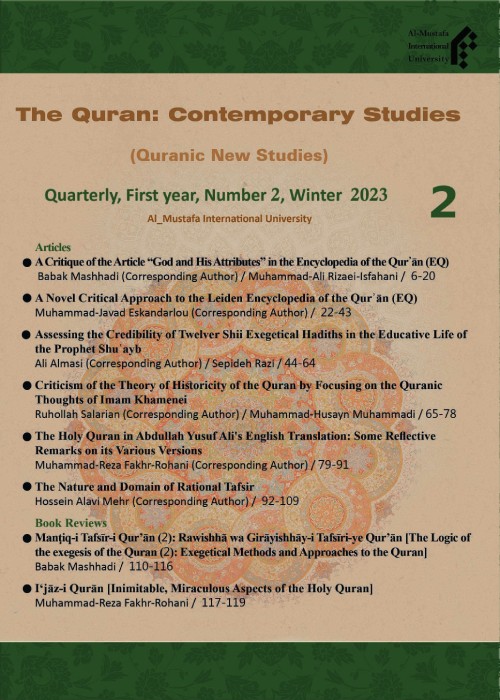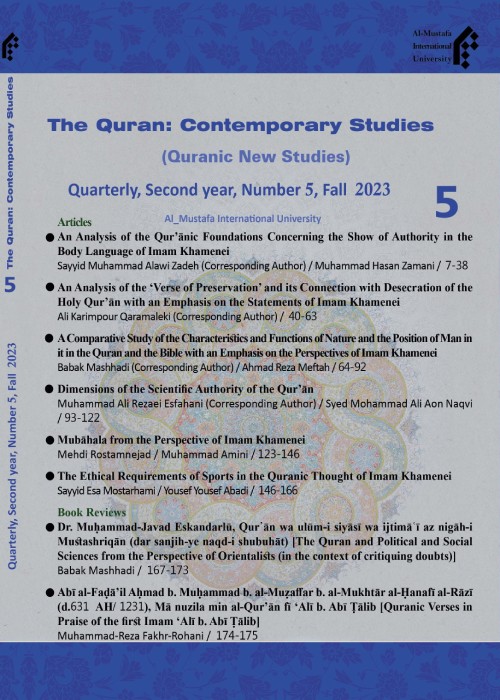فهرست مطالب

Journal of the Quran: Contemporary Studies
Volume:1 Issue: 2, Winter 2023
- تاریخ انتشار: 1401/11/12
- تعداد عناوین: 8
-
-
Pages 6-20
The article “God and His Attributes,” written by Gerhard Böwering, is one of the entries of Brill Encyclopaedia of the Qur’ān, which despite its scholarly merits, has some weaknesses. This research tries to analyze specific weak points with a descriptive-analytical method, based on authentic Islamic sources so that the doubts are identified and answered. Some of the shortcomings of this article include a lack of thorough and genuine attitude toward the concept of God, His Attributes, His Best Names, and certain Qur᾽ānic concepts such as the meaning of al-raḥma, the formation of the skies, and the Prophet’s ascension (miʿrāj) to heaven. The writer shows that Bowering’s attitude toward the topics mentioned above is influenced by his probing about the peri-Islamic milieu, his view about the Qur’ān as a text written and edited by the Prophet, and early Sunni exegeses and hadith collections without analysing their authenticity or their compatibility with scientific findings. Bowering’s attitude towards the Qur᾽ān has resulted in certain judgments about the content and form of this Divine book which are distant from the sublime spirit of the Qur᾽ān which is a revelation both in concepts and wordings. As long as the orientalists such as Bowering are not enlightened to the revelatory nature of the Qur᾽ān, one should not expect a thorough and realistic attitude towards the Qur᾽ān and its teachings.
Keywords: Allāh, Encyclopaedia of the Quran, God’s Attributes, Gerhard Bowering, Orientalists -
Pages 22-43
In this article, after briefly introducing the Leiden Encyclopedia of the Qurʾān, where we mention the strengths and merits of this work on the Qurʾān, its structural and methodological problems are first addressed. Subsequently, the most important problems with the content of this encyclopedia are deliberated and discussed in a logical manner with complete references and documentation. In this way, through the use of descriptive and analytical methods, the shortcomings and methodological errors in Islamic and Qurʾānic studies are identified and explained.In this article, after briefly introducing the Leiden Encyclopedia of the Qurʾān, where we mention the strengths and merits of this work on the Qurʾān, its structural and methodological problems are first addressed. Subsequently, the most important problems with the content of this encyclopedia are deliberated and discussed in a logical manner with complete references and documentation. In this way, through the use of descriptive and analytical methods, the shortcomings and methodological errors in Islamic and Qurʾānic studies are identified and explained.
Keywords: Quran, Orientalism, Orientalist, encyclopedia, JaneDammen McAuliffe -
Pages 44-64
The existence of many hadiths quoted from the Infallible Imams that provide exegeses of Quranic verses makes one of the greatest treasure troves for the correct interpretation of the verses in the Shii school. As the hadiths pertaining to the Quranic stories are mixed with or accompanied by Israelite and fake accounts, it has become difficult to distinguish the correct versions from the wrong ones. Therefore, checking the authenticity of these hadiths paves the ground for understanding the Quranic stories better. In this research, an attempt has been made with regard to verses 84 to 95 of Sura Hūd, the preaching and prophetic life of prophet Shuʿayb (Jethro) in the form of six separate titles with regard to the hadiths presented about these verses in hadith-based tafsir books and by scrutinising their chain of transmission. In general, what has been reported about the story of the prophet Shuʿayb in the hadith-based exegeses is correct, except for a few minor cases, all owing to the existence of some reporters whose reliability has not been ascertained. This research seeks to propose a method similar to what jurists (faqihs, fuqahā) have followed for authenticating hadiths, to propose a method to evaluate and separate credible hadiths from other hadiths in interpretation so that this hadith-based treasure can be used more authentically. The method applied in this research is fundamental (bunyādī), documentary (isnādī), with interdisciplinary data analysis.
Keywords: Exegetical hadiths, Document research, Twelver Shii hadith, Shuʿayb (Jethro), Chain of transmission -
Pages 65-78
Historicism means the limitation of the Quran and its teachings to the recent era and being influenced by the cultural conditions of that community. The limitation of religion and its teachings to the recent era, the ineffectiveness of religion for today's society, and the relativism of the understanding of the Quran are among the important results of this theory. The negative consequences of this theory make the necessity of its criticism clearer. In addition, knowing the foundations and thoughts of Imam Khamenei in comparison to this theory can be considered as a correct and reliable Quranic and Islamic basis. Therefore, in addition to criticizing the arguments of the historicists' view of the Quran, the present article is organized such that it also studies the views of Ayatollah Khamenei in this regard. This research shows that historical verses, occasions of revelation (asbāb al-nuzūl), and apparent contradictions of some verses with scientific findings are the main reasons for historisists' claims. The Holy Quran never accepted the superstitions and false cultures of its era. In addition, the relation of some verses with the occasions of revelation cannot be considered proof of the historicism of the Quran. This is because there are many verses in the Quran for which there are no occasions of revelation, hence it is also necessary to distinguish between the occasions of revelation and the context of revelation. The negation of the historicism of the Quran is quite clear in Imam Khamenei's Quranic thoughts. General guidance of the Quran, comprehensiveness of Quranic teaching, and the Prophet's lifestyle are the significant reasons for the negation of historicism in Imam Khamenei's speeches.
Keywords: Historicism of the Quran, Criticism of historicism, Quranic thoughts of Imam Khamenei, Imam Khamenei, Historicism -
Pages 79-91
There have been several English translations of the Holy Quran. The earliest English translations of the Holy Quran were produced by certain leading Orientalists. Not adequately well-versed in Islamic studies, their English translations were often biased, hence utterly unreliable. This deficiency inspired Muslims to produce English translations of the Holy Quran. Abdullah Yusuf Ali was one of the early Muslim translators of the Holy Quran. Since his translation came on the market, it has received several editions, versions, and adaptations. The present, library-research paper casts a quick and critical look at Ali's English translation and what others have done on it. It is found out that some of the later-on editions of his translation lack many features of his original work.There have been several English translations of the Holy Quran. The earliest English translations of the Holy Quran were produced by certain leading Orientalists. Not adequately well-versed in Islamic studies, their English translations were often biased, hence utterly unreliable. This deficiency inspired Muslims to produce English translations of the Holy Quran. Abdullah Yusuf Ali was one of the early Muslim translators of the Holy Quran. Since his translation came on the market, it has received several editions, versions, and adaptations. The present, library-research paper casts a quick and critical look at Ali's English translation and what others have done on it. It is found out that some of the later-on editions of his translation lack many features of his original work.
Keywords: Abdullah Yusuf Ali, English translations of the Quran, Quran Translation, English for Islamic purposes, some reflective remarks -
Pages 92-109One of the most accepted and acknowledged methods by exegetes for interpreting the Quran is the “Rational Interpretation Method.” In the beginning, it was mentioned in the speeches of the Prophet and his Households. Also, it was accepted today due to the spreading of philosophical, ideological, and rational studies. Tasnim and al-Mizan tafsirs are two of the best-known examples of adopting this method.This article uses a descriptive-analytical method to study the nature and domain of rational tafsir. Based on the results of this study, different opinions about the meaning of rational tafsir were recognized. One opinion considers rational tafsir as the use of rational reasoning, while another opinion presents it the same as reason-based (ijtihādī) tafsir, and another opinion shows it as the use of one’s opinion in interpretation. One more opinion defines it as the scientific interpretation, besides that, an opinion describes it as the use of evidence and reasoning.Among all of these opinions, the most accurate is the one that explains the rational tafsir to be an interpretation of the Quran by using rational proofs. The results that are obtained by this research about rational tafsir with respect to its domain, include experimental reason, theoretical reason, and practical intellect. Rationality in interpretation has different uses, such as analyzing information, solving the obvious conflict among the verses of the Quran, meditation, and showing and explaining the intellectual messages that it contains.Keywords: Rational Interpretation, Rationality, Interpretation, Domain of Rational Interpretation, Rational tafsir


